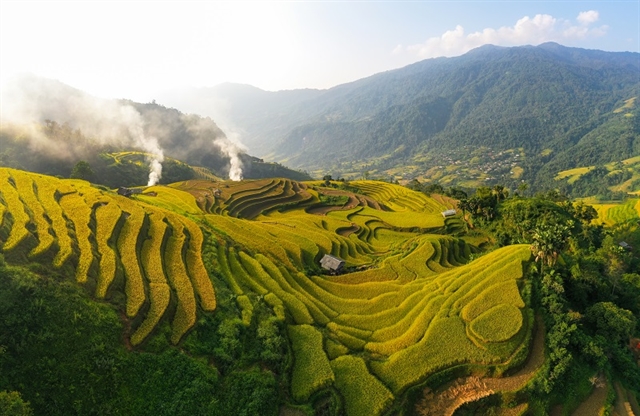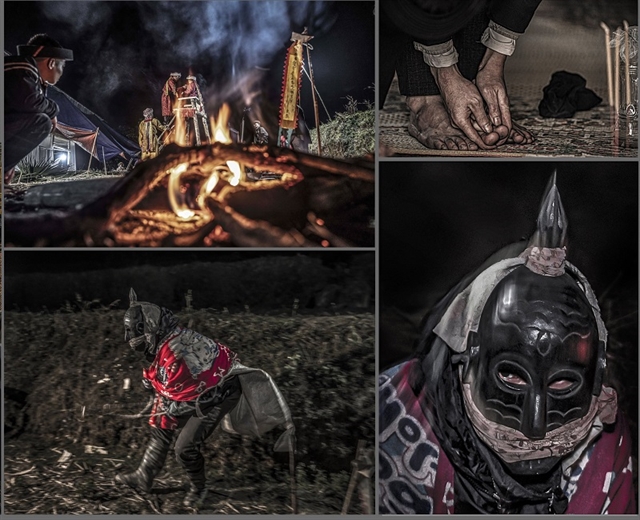In recent years, the Dao people, who account for over 95 per cent of the commune's population, invested in homestay services, serving visitors to eat and stay at their family's traditional stilt houses.

Terraced fields in Cao Bồ Commune. — Photo diendandoanhnghiep.vn
By Lâm Giang
With beauty bestowed by nature, along with the unique cultural treasures of the Dao ethnic group, Cao Bồ Commune in Vị Xuyên District, Hà Giang Province, has become an attractive tourist destination.
Cao Bồ has a poetic landscape with ancient Shan Tuyết tea hills, rich vegetation under the primeval forests of the Tây Côn Lĩnh mountain range and terraced fields winding among the majestic mountainous scenery.
Following Highway 2 in the direction of Hà Giang - Tuyên Quang, through the centre of Đạo Đức Commune, we turned up a small slope winding along the mountainside to reach the centre of the commune.
The road to the commune is dyed yellow by the forest's changing leaves and the murmur of waterfalls and Má Stream. In the distance, the peaceful houses of the Dao are nestled next to terraced fields. Above is the dark green colour of the primeval forest mixed in the mist that covers the top of the mountain. All create a wonderful scene for Cao Bồ.
The commune is surrounded by the primeval old forests of Tây Côn Lĩnh which is considered the roof of the northeast region with an altitude of around 2,430m above sea level. The old forest ecosystem has created precious specialties such as cardamom, medicinal herbs, ginseng and ancient Shan Tuyết tea. This land also has waterfalls with a height of 60m to 100m flowing all year round.

Cao Bồ is surrounded by primeval forests of the majestic Tây Côn Lĩnh mountain range. — Photo diendandoanhnghiep.vn
“Cao Bồ has the vast primeval forests and rich vegetation," said Đặng Văn Chung, chairman of Cao Bồ Commune’s People’s Committee.
"These create great potential for ecotourism and adventure tourism. Mt Tây Côn Lĩnh is really a must-see place for tourists who love to experience and explore the wild beauty of the mountains.
“In the past, the commune authorities coordinated with the relevant bodies to clear the trail to build a sightseeing stop on the top of the mountain.”
In recent years, the Dao ethnics who account for over 95 per cent of the commune's population, invested in homestay services at their family's traditional stilt houses.
Đặng Văn Thái from Lùng Tao Village said: "A few years ago, seeing that tourists came to visit quite a lot, my family bravely invest in homestay service to serve the needs of tourists.
"Currently, there are about 10 households in the village doing homestay services. In addition to food and rest services, we are also ready to offer traditional music performances to our guests.”
The Dao in Cao Bồ still retain their ethnic identity through costumes, festivals, cuisine, folk songs and dances. Rituals such as Lễ cầu mùa (Ceremony to pray for good harvests), Lễ cấp sắc (maturity ritual) along with specialties bearing the local identity like smoked buffalo meat, fish cooked with sour bamboo shoots as well as traditional cakes have become impressive to tourists.

'Lễ cấp sắc' (maturity ritual) is an indispensable cultural and spiritual beauty for the Dao people in Cao Bồ Commune. — Photo diendandoanhnghiep.vn
Cao Bồ has 11 villages. All of them grow tea. The commune has an ideal geographical condition to has become a 'kingdom' of Shan Tuyết tea trees to produce a very fragrant kind of tea for hundreds of year.
We feel like we are lost in another world -- a green world that is very fresh and peaceful of tea fields. There are many tea trees over 100 years old with large branches.

People collect Shan Tuyết tea leaves in Cao Bồ Commune. — VNA/VNS Photo Thanh Giang
In 2015, the Việt Nam Association and Conservation of Nature and Environment awarded the "Việt Nam Heritage Tree" certificate to a population of more than 200 tea trees over 100 years old in Cao Bồ.
The ancient Shan Tuyết tea trees here grow naturally and do not use any chemicals. Thanks to the rare fertility of the land, Cao Bồ ancient tea contains many healthy components. The local tea production has made a significant contribution to poverty alleviation, providing jobs for locals here.
Brewing a pot of Shan Tuyết tea, we feel the delicious taste with the golden colour of the water, the slight bitterness on the tip of the tongue and the sweet taste, bringing us a healthy, comfortable feeling.
Cao Bồ is still very primitive in terms of natural landscape. The hard-working life of the populace has created indigenous cultural values and quintessence to bring the imprint of community tourism developing widely. VNS